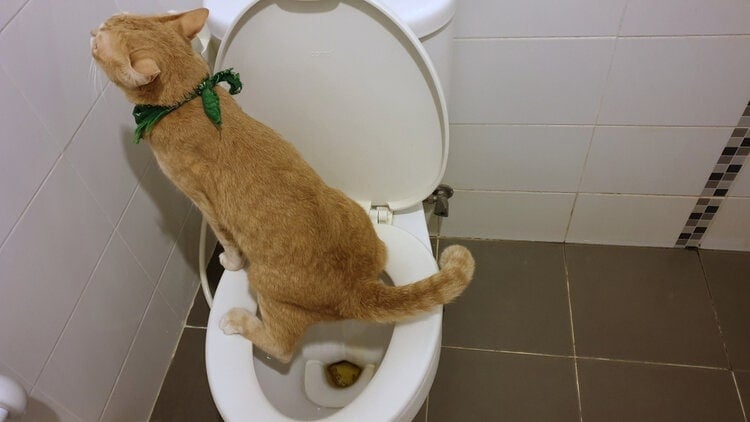Avoid Flush Cat Poop Down Your Toilet - Safeguard Your Plumbing System
Avoid Flush Cat Poop Down Your Toilet - Safeguard Your Plumbing System
Blog Article
We have come across this great article involving How to Dispose of Cat Poop and Litter Without Plastic Bags below on the net and think it made perfect sense to write about it with you on this site.

Introduction
As pet cat owners, it's important to be mindful of how we take care of our feline pals' waste. While it might seem practical to purge pet cat poop down the commode, this practice can have damaging consequences for both the atmosphere and human health.
Alternatives to Flushing
Fortunately, there are more secure and much more responsible means to deal with pet cat poop. Take into consideration the adhering to alternatives:
1. Scoop and Dispose in Trash
One of the most usual method of disposing of feline poop is to scoop it into a naturally degradable bag and toss it in the garbage. Make certain to use a specialized trash scoop and get rid of the waste immediately.
2. Usage Biodegradable Litter
Choose biodegradable feline litter made from products such as corn or wheat. These litters are eco-friendly and can be safely taken care of in the garbage.
3. Hide in the Yard
If you have a yard, think about hiding feline waste in an assigned location away from veggie gardens and water resources. Make certain to dig deep adequate to avoid contamination of groundwater.
4. Install a Pet Waste Disposal System
Buy an animal garbage disposal system particularly created for pet cat waste. These systems use enzymes to break down the waste, lowering smell and environmental impact.
Health Risks
Along with environmental issues, purging feline waste can also posture wellness risks to humans. Cat feces may have Toxoplasma gondii, a bloodsucker that can cause toxoplasmosis-- a possibly serious ailment, specifically for expecting females and individuals with damaged immune systems.
Environmental Impact
Flushing cat poop introduces dangerous pathogens and bloodsuckers right into the water supply, presenting a substantial danger to water ecosystems. These pollutants can adversely influence aquatic life and concession water high quality.
Conclusion
Accountable family pet possession extends beyond providing food and shelter-- it additionally includes appropriate waste administration. By avoiding flushing cat poop down the bathroom and choosing alternative disposal methods, we can lessen our ecological footprint and safeguard human wellness.
Why You Should Never Flush Cat Poop Down the Toilet
A rose by any other name might smell as sweet, but not all poop is created equal. Toilets, and our sewage systems, are designed for human excrement, not animal waste. It might seem like it couldn’t hurt to toss cat feces into the loo, but it’s not a good idea to flush cat poop in the toilet.
First and foremost, assuming your cat uses a litter box, any waste is going to have litter on it. And even the smallest amount of litter can wreak havoc on plumbing.
Over time, small amounts build up, filling up your septic system. Most litter sold today is clumping; it is made from a type of clay that hardens when it gets wet. Ever tried to scrape old clumps from the bottom of a litter box? You know just how cement-hard it can get!
Now imagine just a small clump of that stuck in your pipes. A simple de-clogger like Drano isn’t going to cut it. And that means it’s going to cost you big time to fix it.
Parasitic Contamination
Believe it or not, your healthy kitty may be harboring a nasty parasite. Only cats excrete Toxoplasma in their feces. Yet it rarely causes serious health issues in the cats that are infected. Most people will be fine too if infected. Only pregnant women and people with compromised immune systems are at risk. (If you’ve ever heard how women who are expecting are excused from litter cleaning duty, Toxoplasma is why.)
But other animals may have a problem if infected with the parasite. And human water treatment systems aren’t designed to handle it. As a result, the systems don’t remove the parasite before discharging wastewater into local waterways. Fish, shellfish, and other marine life — otters in particular — are susceptible to toxoplasma. If exposed, most will end up with brain damage and many will die.
Depending on the species of fish, they may end up on someone’s fish hook and, ultimately on someone’s dinner plate. If that someone has a chronic illness, they’re at risk.
Skip the Toilet Training
We know there are folks out there who like to toilet train their cats. And we give them props, it takes a lot of work. But thanks to the toxoplasma, it’s not a good idea.

I was made aware of that report on How to Dispose of Cat Poop and Litter Without Plastic Bags through a good friend on our other web property. In case you enjoyed our blog posting kindly remember to pass it around. Thanks so much for taking the time to read it.
Request An Appointment Report this page